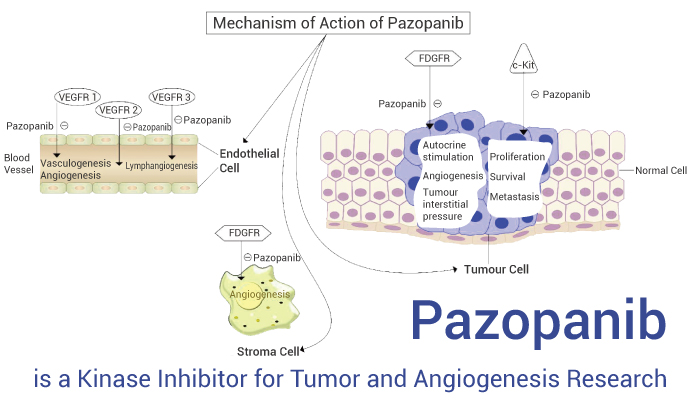Solid tumors are dependent for growth on nutrients and oxygen they receive via angiogenesis, the process wherein new capillaries are formed from existing blood vessels. In addition, many studies demonstrated that a number of endogenous proteins promote the growth of solid tumors among which Vascular Endothelial Growth Factor (VEGF) is the key point. However, why VEGF is the key point in the progress of solid tumors growth? Tumors secret VEGF, which induces a mitogenic response through its binding to one of three tyrosine kinase receptors (VEGFR-1 to -3) on nearby endothelial cells. Thus inhibition of this signaling pathway should block angiogenesis and subsequent tumor growth. Hence, we will introduce Pazopanib (GW786034), a novel and potent pan-VEGFR inhibitor. Besides, Pazopanib is under clinical development for renal-cell cancer and other solid tumors.

Pazopanib is a potent VEGFR inhibitor for solid tumors research.
Pazopanib shows good potency against all the human VEGFR with IC50 values of 10, 30, and 47 nM for VEGFR-1, -2, and -3, respectively. Moreover, Pazopanib showed significant activity to against the closely related tyrosine receptor kinases PDGFRβ, c-Kit, FGF-R1, and c-fms with IC50s of 84, 74, 140, and 146 nM, respectively. Besides, in addition to inhibiting the VEGF-induced proliferation of HUVECs, Pazopanib potently inhibits VEGF-induced phosphorylation of VEGFR-2 in HUVEC cells with an IC50 of ~8 nM.
Treatment of mice with 100 mg/kg of Pazopanib twice daily for five days results in significant inhibition in the degree of vascularization. In addition, Pazopanib shows good antiangiogenic activity in mice bearing established human xenografts using HT29 (colon carcinoma) and HN5 (head and neck carcinoma) tumors.
In a word, Pazopanib is a promising VEGFR inhibitor for tumor and angiogenesis research.
Reference:
[1] Harris PA, et al. J Med Chem. 2008 Aug 14;51(15):4632-40.